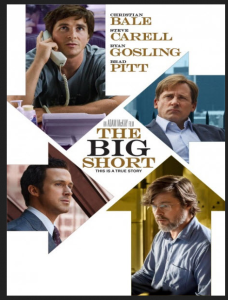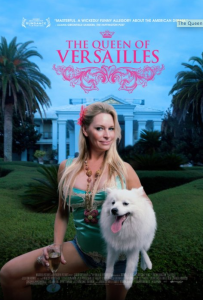January 4th, 2016 — 4:03am
***
 The Big Short-rm
The Big Short-rm
You probably know that this movie is not about pants or the measurement of peoples’ height. It is about one of the largest financial meltdowns in this country’s history and how much of it was because of some behind-the-scenes financial trickery carried on by Wall Street insiders. It is based on a book by Michael Lewis which we have not read, although M.B. did read and recommend another book by him, Flash Boys which is about a different type of financial manipulation carried by some Wall Street people
In The Big Short, Christian Bale plays Michael Burry, a real person who is a brilliant, somewhat peculiar guy, maybe Asperger type. He actually was a physician who ended up as a chief of a large financial fund. He studies numbers very carefully and concludes that the mortgage market which has always been thought to be reliable and dependable, is on the verge of collapse. The reason for this (now this is the tricky part) is because hundreds or maybe thousands of mortgages have been lumped together in mortgage bond funds that people buy and trade for the high interest rates that they generate. These funds include AAA mortgages, BB and C mortgages, the latter groups being known as subprime mortgages.
Nobody seemed to have noticed how fragile and vulnerable these mortgage funds are and that this house of cards was on the verge of collapse. That is except this one strange guy and a few other financial wheeler dealers who get wind of what’s going down. Once such team is led by a character played by Steve Carell, who continues to demonstrate his acting chops in serious roles. There are the usual excellent depictions of various key players by Brad Pitt and Ryan Gosling.
There are some riveting dramatic moments as the movie goer can get caught up in the impending crash. You may not fully understand exactly what is happening but don’t feel badly since most people didn’t either as it was really happening. When the dust cleared, this cost our economy over a billion dollars (this movie only cost $28 million). We hope that people who run and regulate our economy learned some lessons from this story, but that probably is not the case. Many people, though, will find this movie quite enjoyable although it may make you uncomfortable about the future. (2015)
Comment » | 3 Stars, Drama
January 5th, 2015 — 2:44am
**
The Queen of Versailles – nf Mrs. American, a Florida beauty pageant winner marries 2nd husband David Siegel, one the richest men in the country thanks to his success selling time-shares. He is 30 years her senior and they go on to have eight children. Although they live in a mansion with nannies and other help, they set about to build the largest house under one roof in the United States. They fashion it after the Palace of Versailles and it will have more than 90,000 square feet. Their life style includes limousines, extravagant furnishings and clothes, as well as everything for their children. If there ever were a family to which the term “ life styles of the rich and famous†would apply, it would be to this one. Mr. Siegel even takes credit for election of George W. Bush by carrying Florida because of his great financial support of him (which he even acknowledges might have been a little illegal.) He owns one of the largest buildings in Las Vegas, which he turns into a time-share operation. Mr. Siegel’s timeshare selling team won’t take no for an answer and they have a time-share for every budget. Filmmaker Lauren Greenfield realizes that this couple would be a fascinating subject for a documentary film and they agree to the project. If this were the entire story, it would probably be an interesting film which would provide insight into how people with essentially unlimited money live their lives. However, this project was started a little before 2008 when the US was hit with a gigantic stock market and real estate crash. Too many Americans had “sub-prime “mortgages, meaning they held mortgages, on which they could no longer make their payments once the economy, went bad. This not only impacted the little guy, or even the average family but it affected big time, timeshare mogul David Siegel who suddenly found that he could not pay his loans. His financial world came crashing down around him. The film became the story of how this family began to deal with the sudden completely unexpected change of events for them. They had to put their unfinished dream house up on the market with nary a buyer in sight. They had to radically cut back on all their help, stop their extravagant spending and even started to have arguments about keeping unnecessary lights on in their house. Even if this is not exactly rags to riches and back to rags, it is a lesson in how people often don’t appreciate what they have and when they have it want more. While the message may have long lasting meaning, the nuances of the economy problems seem somewhat dated, the movie also feels that way. Hopefully new regulations put in place will at least protect the little guy in the future. The big boys usually fend for themselves. We did a search to find out how the folks in the film were doing today which revealed that in 2014, the filmmaker and the Siegels were suing each other for issues related to the movie. (2012)
Comment » | 2 Stars, Documentary
 The Big Short-rm
The Big Short-rm



